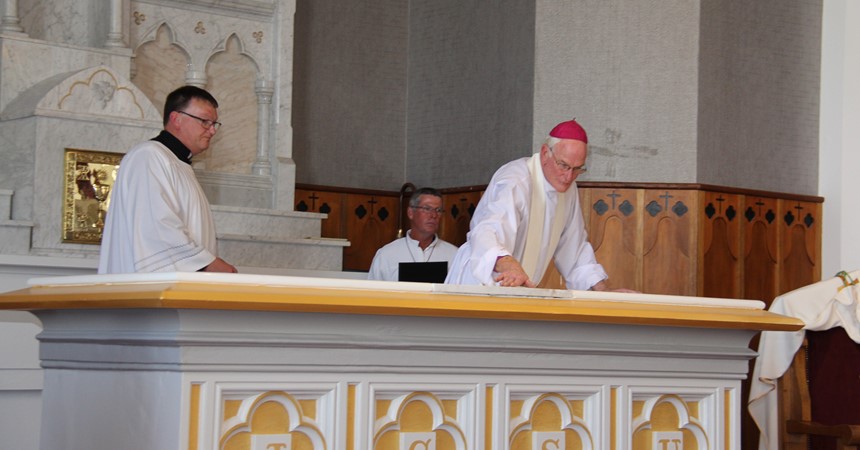It was 1992.
That was the year my journey into the study of liturgy, in all its glory, began. And I remember exactly how it started, as well.
It was my first year of seminary formation and education, and one of the courses that was required was entitled “Introduction to Liturgy”. The lecturer’s knowledge of and passion for his subject matter was palpable – and contagious!
During the course, I discovered an entirely new language – the language of ritual – with a unique vocabulary, a unique ‘alphabet’, and a unique way of being enacted. I was hooked, and from that moment until now my passion for understanding this language has not diminished, while my knowledge has, I hope, increased across the years.
Most of the knowledge I have gained is useful on an almost daily basis. Other knowledge I have gained is arcane and obscure; the kind of stuff that could be very helpful if the right kind of question is asked during a trivia contest. All of it, however, has contributed to my current role as Master of Ceremonies (MC).
As mentioned last week, the Ceremonial of Bishops (n. 34) suggests that
For a liturgical celebration, especially a celebration presided over by the bishop, to be distinguished by grace, simplicity, and order, a master of ceremonies is needed to prepare and direct the celebration in close cooperation with the bishop and others responsible for planning its several parts, and especially from a pastoral standpoint.
The master of ceremonies should be well-versed in the history and nature of the liturgy and in its laws and precepts. But equally he should be well-versed in pastoral science, so that he knows how to plan liturgical celebrations in a way that encourages fruitful participation by the people and enhances the beauty of the rites.
He should seek to ensure an observance of liturgical laws that is in accord with the true spirit of such laws and with those legitimate traditions of the particular Church that have pastoral value.
And by the way, the Ceremonial of Bishops is one of those obscure and potentially arcane liturgical books with which liturgists and those who find themselves in the role of MC become intimately familiar. It shouldn’t surprise you that I’ve had my own personal copy for many years and that it is well used.
The practical dimension of my passion for and knowledge of liturgy finds fulfilment in the exercise of the MC role, whereby I assist not only the Bishop but also the wider Church of Maitland-Newcastle in the planning for and celebration of its liturgical life. It’s not just about taking the ritual book from a shelf and then doing what is found in them. The liturgy of the Church is not found in those books, despite their significance.
And that is because ‘the liturgy’ only truly exists when it is enacted, when it is celebrated on a particular occasion and in a particular place. Having someone like the Master of Ceremonies to assist in bringing ritual texts to life is thus to offer their passion and knowledge to the wider Church for the sake of the Church’s liturgical life.
And I truly enjoy what I do in the role. I truly enjoy contributing to the liturgical life of the Church of Maitland-Newcastle. I truly believe that this is another way in which I can play a small part in the broader mission of the Church.
Who do I work with and for in my role as Master of Ceremonies?
Most people will be aware of the presence of an MC on those more significant occasions when the Bishop is celebrating liturgies with the People of God such as the annual Chrism Mass, the Ordination of Deacon or Priest, or the Dedication of a Church. The role of MC is intimately linked to the liturgical role of the Bishop because of the ‘unusual’ nature of some of these rarer liturgical celebrations. Having an MC guiding such events means the celebration can be celebrated by the assembled People of God with the grace and beauty that such celebrations require.
The MC will also work with other liturgical ministers (musicians, proclaimers, sacristans, etc.) in the planning and enactment of a particular liturgical celebration. Liturgy is a ‘team effort’ that requires coordination, cooperation and charity, all because it is never about individuals and always about the worship of God by God’s People.
But it’s not only the Bishop that an MC assists. The other contribution an MC can make to the broader Church is by being a point of reference, a resource that parishes, agencies, and individuals can contact for assistance in planning particularly unusual liturgies, for help in developing an understanding of the liturgy and liturgical principles, and for guidance on liturgical practices. All of these services are part of the MC’s role.
After all, the liturgy doesn’t belong to the MC, it belongs to the Church, and my passion and knowledge – regardless of how obscure – is not meant to be kept to myself but placed rather at the service of the Church for the worship of God.
Fr. Andrew Doohan
Master of Ceremonies
Diocese of Maitland-Newcastle

